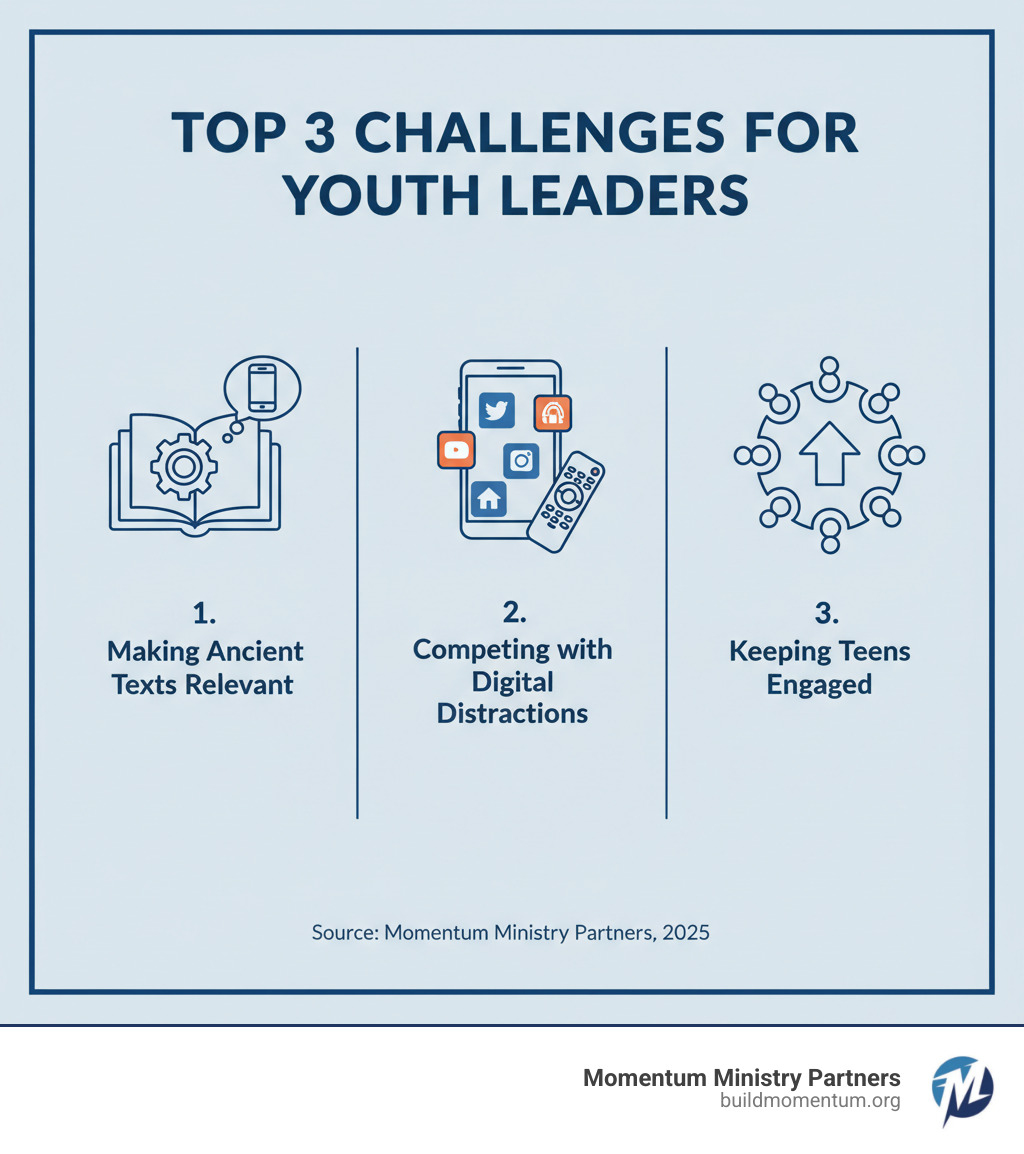Why Traditional Youth Bible Studies Fall Short
Bible studies for teens often struggle to compete with smartphones, sports, and social lives. Research shows that 70% of teens are more likely to attend church when their friends are there, but keeping them engaged once they arrive presents a different challenge entirely.
Top Bible Study Resources for Teens:
- Topical studies addressing identity, stress, and relationships
- Interactive curricula with discussion guides and activities
- Video-based series that connect Biblical truths to modern life
- Devotional books designed for teenage attention spans
- Question-driven materials that encourage deep thinking
The problem isn’t that teens don’t care about faith—young people are often compelled by Jesus, even when they’re unsure about religion. The challenge lies in making ancient texts feel relevant to teenagers navigating questions of identity, belonging, and purpose in today’s world.
Youth leaders face a host of obstacles: relating Biblical stories to modern life, competing with countless distractions, and creating studies that spark genuine change rather than just filling time. When planning fails to consider the actual teenagers in the room—their personalities, comfort levels, and real-world experiences—even the most creative object lessons can fall flat.
I’m Jeff Bogue, and over three decades of ministry leadership, I’ve found that effective Bible studies for teens require intentional planning that meets young people where they are while pointing them toward Christ. Through my work with Momentum Ministry Partners, I’ve seen how the right approach transforms both students and the leaders who serve them.

Step 1: Choosing Topics That Connect with a Teen’s World
The secret to creating Bible studies for teens that actually matter starts with understanding what keeps teenagers awake at night. It’s not just homework or weekend plans—today’s teens are wrestling with profound questions about who they are, where they belong, and why their lives matter.

Too many youth leaders fall into the trap of choosing topics that sound “churchy” but miss the mark entirely. Meanwhile, teenagers are dealing with anxiety about their future, navigating complex friendships, and trying to figure out their identity in a world that constantly tells them who they should be.
The most effective Bible studies for teens address these core struggles head-on. When we focus on topics like belonging and friendship, purpose and calling, stress management, and navigating social media Biblically, we’re not just teaching—we’re providing lifelines.
Think strategically about your teaching calendar. Ask yourself: “What do I want these students to understand about God and themselves after spending a year with us?” This long-term vision helps you build a foundation rather than just covering random topics week by week.
The beauty of Scripture is that it speaks directly to teenage concerns. When we explore integrity and purity, we’re addressing their real-world decisions. When we dive into understanding family relationships, we’re giving them tools for the conflicts happening at their dinner tables tonight.
For more on shaping a teen’s future, see 3 Big Questions That Shape Your Future. Get ideas for engaging discussions with Youth Group Debate Topics.
Tackling Tough Questions
Creating Bible studies for teens means accepting that no topic is off-limits when approached with wisdom and grace. Teenagers are already thinking about the hard stuff—sexuality, doubt, suffering, social justice—and they need safe spaces to process these realities through a Biblical lens.
The key is creating an environment where honest questions are welcomed, not shut down. When a student asks why God allows suffering, that’s not a threat to faith—it’s an invitation to explore the depth of Scripture together. When they struggle with doubt, we can show them that even Biblical heroes wrestled with God.
Young people are often drawn to Jesus even when they’re unsure about organized religion. This gives us incredible opportunity to point them directly to Christ’s character rather than getting bogged down in religious rules that feel disconnected from their lives.
Learn more about Handling Difficult Topics in Your Youth Group.
Differentiating for Middle School vs. High School
The gap between a sixth-grader and a senior is enormous, and effective Bible studies for teens must account for these developmental differences.
Middle schoolers thrive on concrete stories and action-oriented lessons. They connect with Biblical narratives like David facing Goliath or Esther standing up for her people. Their shorter attention spans mean you’ll want to incorporate group games, dramatic readings, and hands-on activities that help them experience the text rather than just hear about it.
High schoolers are ready for deeper theological exploration. They can handle abstract concepts like sanctification, wrestle with questions about Biblical authority, and engage in sustained discussions about how faith intersects with their future decisions. This is the age to explore topics like developing a Biblical worldview or understanding God’s calling on their lives.
The mistake many leaders make is assuming what teenagers already know about the Bible. Always assess their Biblical literacy and meet them where they actually are, not where you think they should be. Consider the personalities and comfort levels of the specific students in your room—this awareness will transform how you approach every lesson.
Find age-appropriate Bible Lessons for High Schoolers.
Step 2: Mastering Methods for Effective Bible Studies for Teens
Once we’ve chosen relevant topics, the next step is mastering teaching methods that truly engage teenagers. The difference between a Bible study that teens tolerate and one they eagerly anticipate often comes down to how we present God’s Word. We need approaches that capture their attention, spark meaningful conversations, and help Scripture come alive in their everyday lives.

The Power of Asking, Not Just Telling
Jesus rarely gave straight answers to questions—He often responded with even better questions. There’s profound wisdom in this approach for our Bible studies for teens. When we use question-based teaching, we move students from being passive listeners to active finders of truth.
Instead of simply telling teens what a passage means, we guide them to find answers themselves through thoughtful questions. “What do you notice about how Jesus responds here?” or “How might this look different in your school?” These open-ended questions using the Socratic method drive students back to the Biblical text and encourage them to wrestle with its meaning.
This approach creates ownership. When a teenager finds a truth for themselves rather than hearing it in a lecture, it becomes theirs in a deeper way. The goal isn’t just to fill their minds with information—it’s to help them connect personally with God’s Word and see how it applies to their Monday morning chemistry class or Friday night social dilemmas. You can learn more about facilitating these discussions with our guide on How to Get Your Youth Group Talking.
Engaging Different Learning Styles
Every teenager in your group processes information differently. Some need to see it, others need to hear it, and many need to experience it hands-on. Effective Bible studies for teens incorporate multiple approaches to ensure everyone can connect with the material.
Inductive Bible Study remains one of the most powerful methods for helping students dig deeper into Scripture. This approach encourages teens to observe what the text actually says, interpret what it means in context, and then apply it to their lives. It’s like giving them tools to mine Biblical treasure for themselves rather than just handing them someone else’s findings. Learn more with our Inductive Bible Study Guide.
Simple acronyms like SOAP or APPLE provide structure for personal reflection and small group discussions. SOAP—Scripture, Observation, Application, Prayer—gives teenagers a framework they can use long after they leave your youth group. APPLE—Apply, Pray, Ponder, Listen, Express—offers another accessible approach to engaging with God’s Word.
Communal Scripture reading creates powerful shared experiences. When your group reads extended passages aloud together, something beautiful happens. The Word washes over everyone simultaneously, creating a sense of unity and allowing the rhythm and poetry of Scripture to be felt, not just understood intellectually.
Storytelling and collaborative performance bring Biblical narratives to life in memorable ways. Assigning different teens to be narrators, main characters, or even the voice of God transforms ancient stories into vivid experiences that stick with them long after the study ends.

Incorporating Creative & Sensory Elements
Teenagers live in a world of constant sensory input, so our Bible studies for teens should engage multiple senses to create lasting impact. The key is using creativity purposefully—each element should deepen understanding rather than simply entertain.
Object lessons can be incredibly powerful when thoughtfully planned. The goal is to create “aha!” moments where abstract Biblical concepts become concrete and memorable. Maps and visual aids help ground Biblical stories in real geography and historical context, making ancient events feel more tangible and believable.
Music and worship naturally flow from many Biblical topics, allowing teens to respond emotionally and spiritually to what they’re learning. Art responses—whether drawing, painting, or sculpting—give creative learners a way to process and express their understanding of Scripture that goes beyond words.
Drama and skits work especially well with this age group, whether they’re acting out Biblical scenes or creating modern scenarios that parallel the lesson’s themes. Sensory experiences can create unforgettable connections—imagine bringing bottles of frankincense and myrrh to a Christmas study, then discussing how we can be “the aroma of Christ” in our schools and communities.
It’s crucial to help teenagers understand Biblical genres so they can properly interpret what they’re reading. The Bible is like a library containing many different types of books, each with its own style and purpose. When Jesus says “I am the door” in John 10:9-10, we help teens understand He’s using metaphor to describe salvation, not claiming to be a literal wooden door.
By utilizing these guided-findy and creative learning methods rather than relying solely on lectures, we help students actively participate in their faith journey and develop skills for lifelong Bible study.
Step 3: Finding Quality Resources and Curricula
Choosing the right materials can make or break your Bible studies for teens. With countless options available, it’s easy to feel overwhelmed by curriculum catalogs and online resources. The key is knowing what actually works in real youth ministry settings.

What to Look for in a Teen Bible Study Curriculum
When I walk into a Christian bookstore and see walls of youth curriculum, I’ve learned to look past the flashy covers and ask deeper questions. Biblically sound content comes first—does this material accurately represent Scripture and sound theology? Too many resources water down Biblical truth to make it more palatable.
Age-appropriate content matters more than you might think. A curriculum designed for high schoolers will lose middle schoolers completely, while elementary-level material will bore your teenagers. The language, examples, and discussion depth should match where your students actually are developmentally.
Look for materials that are genuinely engaging without relying on gimmicks. Interactive elements and relatable scenarios work, but they should serve the Biblical content, not overshadow it. Easy to use resources save you precious preparation time—clear leader guides, discussion prompts, and activity suggestions make your job manageable.
The best curricula are application-focused, moving students from “that’s interesting” to “how does this change my life?” True Bible study leads to change, not just information. Finally, choose resources that foster discussion through open-ended questions and peer interaction. Teenagers learn as much from each other as they do from you.
Recommended Bible Study Resources for Teens
Devotional books have become some of our most effective tools for group discussions. They provide structure while prompting deeper questions and personal reflection. These resources often weave inspiring stories with students’ own experiences, creating natural conversation starters.
Video series can capture attention in ways that traditional teaching sometimes can’t. Platforms like The Bible Project offer free, self-paced classes taught by Biblical scholars. Their content covers everything from Old Testament narratives to New Testament letters, helping students wrestle with challenging passages at their own pace.
Topical studies address the real issues teenagers face daily. Resources focusing on themes like identity, stress, friendship, and technology meet students where they are. These studies often include leader guides and printable materials, making preparation straightforward for busy youth leaders.
For deeper Biblical understanding, book-by-book studies offer systematic exploration of Scripture. These resources help teens understand how we got the Bible, its trustworthiness, and its organization while teaching good study habits that will serve them for life.
Some of the most creative curricula integrate popular culture references to make Biblical concepts accessible. When done thoughtfully, these resources demonstrate how faith intersects with everyday life, showing teenagers that the Bible speaks to their world.
The best resources offer flexibility—from single sessions to multi-week series—allowing you to tailor content to your specific group’s needs and schedule. Check out our top picks for Essential Student Bible Study Books.
No curriculum is perfect for every group. The most important factor is how well the material fits your students and your teaching style. Sometimes the simplest resources, used with genuine care and prayer, create the most profound impact in young lives.
Step 4: Fostering Deeper Reflection and Spiritual Growth
The ultimate goal of any Bible study for teens isn’t simply filling their heads with knowledge—it’s watching their hearts transform as they encounter Jesus. We want our students to move beyond being hearers of the Word to becoming doers who live out their faith in everyday life.

Moving from Information to Change
True Bible study leads to change, not just information. This change happens when students receive God’s Word, live it out, and are daily transformed by truth through Scripture and the Holy Spirit. The question isn’t whether teens can memorize verses—it’s whether they’re allowing those verses to reshape how they live, love, and respond to the world around them.
Creating space for reflection becomes crucial in this process. After teaching, we intentionally provide quiet moments for students to process what they’ve heard. This might look like silent prayer while worship music plays softly, or simply giving them time to sit with their thoughts and let the Holy Spirit work.
Journaling prompts can be incredibly powerful tools for helping teens articulate their thoughts, feelings, and commitments. Instead of generic questions, we offer specific sentence starters like “God, I never realized that…” or “This week, I want to…” These prompts help students internalize the message and make it personal.
Prayer time shouldn’t be an afterthought tacked onto the end of your study. We teach students how to pray for themselves, for each other, and for their world in response to what they’ve learned from God’s Word. When teens see prayer as conversation with God rather than religious obligation, everything changes.
Accountability partners can significantly aid in living out Biblical truth. Pairing students with trusted friends or mentors to discuss applications and pray for each other creates ongoing support beyond your weekly meeting time.
Understanding why God’s Word is true and how to rightly interpret Scripture leads to deeper relationships with Jesus and guards against deception. We emphasize the practical “3 P’s” of Bible study: prioritizing time with God, planning specific study times, and establishing a specific place for personal Bible reading. These simple steps help develop the spiritual discipline that will sustain teens long after they graduate from your youth group. Understand The Basics of Spiritual Growth in Students.
Ensuring Your Bible Studies for Teens Point to Jesus
Every Bible study for teens should ultimately point students toward Jesus and foster genuine spiritual growth. He is the center of our faith, and His character, teachings, and redemptive work should shine through every lesson we teach.
Keeping your teaching Gospel-centered means consistently connecting the Biblical narrative back to the Gospel message—God’s love, our sin, Jesus’ sacrifice, and the offer of salvation and new life in Him. Whether you’re teaching from the Old Testament or the New, there are threads that lead to Christ, and teens need to see those connections.
Highlighting Jesus’ character helps teens see who He really is—His compassion for the hurting, His power over sin and death, His wisdom in difficult situations, and His incredible grace toward broken people. We want students to understand their identity in Christ, recognize the reality of sin, accept the renewal Jesus offers, and feel called to share their faith with others.
Focusing on relationship over rules acknowledges that while Biblical principles matter deeply, Christianity is fundamentally about knowing and following Jesus, not just keeping a checklist. We want teens to encounter Christ personally and be compelled by His love rather than motivated by fear or obligation.
Modeling personal faith as leaders cannot be understated. Our own faithfulness, genuine friendship, and Christ-like leadership inspire teenagers in their faith journeys. Like Timothy’s example in Scripture, we encourage students to accept their faith boldly, lead by example in their schools and communities, and build strong, supportive Christian friendships.
We’re dedicated to equipping students not only to understand their identity in Christ but also to share their faith effectively with others. This naturally integrates missions education into our studies, helping teens see that their faith has implications beyond themselves. Learn the 3 Essentials to Effective Student Discipleship.
Frequently Asked Questions about Teen Bible Studies
Youth leaders often face similar challenges when planning Bible studies for teens. These common questions reflect the real struggles of creating meaningful experiences that engage teenagers and foster spiritual growth.
How do I get quiet teenagers to participate in discussions?
Drawing out quieter students requires intentional strategies that create safe spaces for sharing. Think-pair-share works wonderfully—ask a question, give students a minute to think individually, then have them discuss with a partner before sharing with the larger group. This approach reduces pressure and allows them to formulate thoughts without feeling spotlighted.
Ask questions with no single right answer. Open-ended questions about feelings, personal experiences, or interpretations often feel less intimidating than questions requiring specific Biblical knowledge. A question like “How did you feel when you read this passage?” invites personal reflection rather than testing their memory.
Small groups can transform the dynamic entirely. Breaking into smaller circles makes it easier for shy students to speak up, especially when you appoint a gentle facilitator for each group to ensure everyone has a chance to contribute.
Consider providing questions in advance when possible. Sharing discussion questions before the study gives students time to reflect and prepare their answers, which can be particularly helpful for introverted teens who process internally.
Most importantly, create a culture where every voice is valued. Affirm every contribution, no matter how small. Avoid interrupting or correcting in ways that discourage future sharing. Sometimes, just sitting with uncomfortable silence for a moment can prompt someone to speak—resist the urge to fill every pause immediately.
What if I don’t know the answer to a teen’s question?
It’s perfectly okay and even beneficial to admit when you don’t know something. This models humility and demonstrates what lifelong learning looks like in the Christian faith.
Be honest and say, “That’s a great question, and I don’t know the answer right now.” Then praise their curiosity—”I love that you’re asking that!” These responses affirm thoughtful inquiry and show that questions are welcome.
Commit to finding the answer together. Offer to research it for the next session or, even better, invite the student to help you find the answer. This empowers them and shows that learning is a collaborative journey rather than a one-way information transfer.
Model what it looks like to be a lifelong learner of God’s Word. This teaches them that faith isn’t about having all the answers immediately, but about continually seeking God and His truth. Your willingness to say “I don’t know” can actually strengthen your credibility and deepen their trust.
How long should a teen Bible study be?
A good target for Bible studies for teens is 45-60 minutes. This duration allows enough time for a welcome activity or icebreaker (5-10 minutes) to build community and get everyone comfortable, followed by teaching or presentation (15-20 minutes) to deliver the core Biblical content in an engaging way.
The most crucial portion is discussion and application (15-20 minutes), where students process and apply the truth they’ve encountered. Finally, prayer and wrap-up (5 minutes) concludes with a clear takeaway and connection to God.
However, flexibility remains essential. Always “read the room”—sometimes the best moments happen when you deviate from the plan because a discussion is particularly rich or a student needs more time to process something meaningful. The Holy Spirit often works in unexpected ways during these unscripted moments.
The goal is engagement and spiritual growth, not rigidly adhering to a schedule. If teens are deeply engaged in discussing how a Biblical principle applies to their lives, don’t cut them off simply because the clock says it’s time to move on. These organic moments of connection often produce the most lasting impact.
Conclusion: Building a Ministry That Lasts
Creating Bible studies for teens that genuinely capture their hearts and minds isn’t about having the flashiest activities or the most expensive curriculum. It’s about being intentional with every element—from the topics that address their deepest questions to the teaching methods that help them find truth for themselves.
When we choose subjects that speak to teenagers’ real struggles with identity, belonging, and purpose, we show them that God’s Word isn’t ancient history—it’s a living guide for their daily lives. When we use engaging teaching styles that honor different learning preferences, we create space for every student to encounter Jesus in their own way. And when we consistently point them toward a deeper, transformative relationship with Christ, we’re building something that will last far beyond their youth group years.
Community remains the cornerstone of effective youth ministry. A Bible study where teens feel truly known, heard, and valued becomes a place they eagerly return to week after week. It’s in these authentic relationships that real spiritual growth happens—not just during the formal study time, but in the conversations afterward, the texts throughout the week, and the life-on-life moments that naturally unfold.
The challenges are real. Competing with endless distractions, making ancient texts feel relevant, and keeping teenagers engaged requires wisdom, patience, and a lot of prayer. But the opportunity is even greater. This generation is hungry for authenticity, purpose, and hope—exactly what Jesus offers.
At Momentum Ministry Partners, we understand both the struggles and the incredible potential in youth ministry. We’re committed to equipping leaders like you with practical tools, Biblical wisdom, and ongoing support to create these life-changing experiences in partnership with your local church. Because when we invest in the next generation’s faith, we’re not just filling time—we’re building a ministry that will impact eternity.
Explore our comprehensive Youth Ministry strategies and resources.







0 Comments